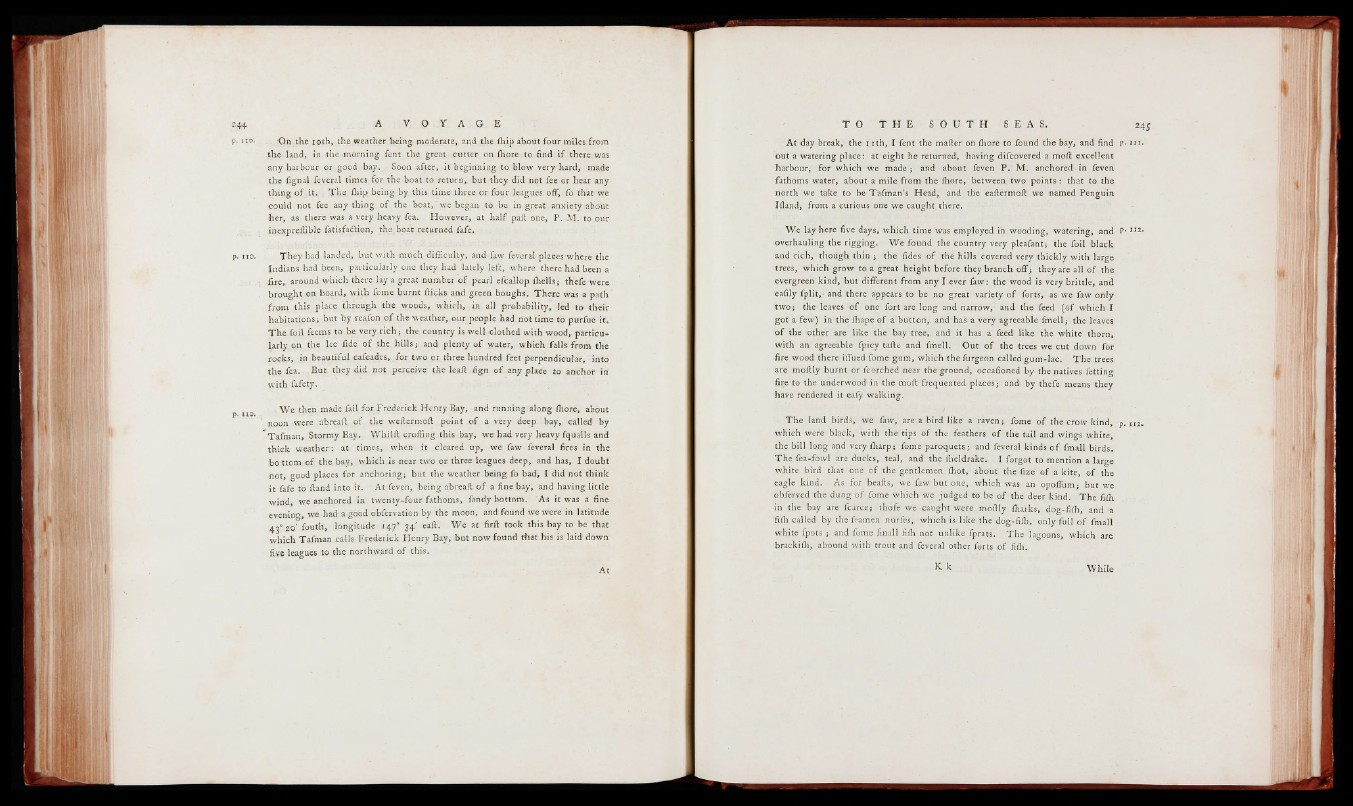
p. no. On the ioth, the weather being moderate, and the ihip about four miles from
the land, in the morning fent the great cutter on ihore to find i f there was
any harbour or good bay.. Soon after, it beginning to blow very hard, made
the fignal feveral times for the boat to return, but they did not fee or hear any
thing of it. The Ihip being by this time three or four leagues off, fo that tye
could riot fee any thing of the boat,'we began to be in great anxiety about
her, as there was a very heavy fea. However, at half pail one, P. M. to our
inexpreffible fatisfadliori, the boat returned fafe.
p. no. They had landed, but with much difficulty, and faw feveral places where the
Indians had been, particularly one they had lately left, where there had been a
fire, around which there lay a great number of pearl efcallop fhellsj thefe were
brought on board, with fome burnt flicks and green boughs. There was a path
from this place through the woods, which, in all probability, led to their
habitations; but by reafon of the weather, our people had not time to purfue it.
Th e foil feems to be very rich; the country is well clothed with wood, particularly
on the lee fide of the hills; and plenty of water, which falls from the
rocks, in beautiful eafeades, for two or three hundred feet perpendicular, into
the fea. But they did not perceive the leaft fign of any place to anchor in
with fafety.
- We then made fail for Frederick Henry Bay, and running along ihore, about
noon were abreafl of the weflermofl point of a very deep bay, called by
~Tafman, Stormy Bay. Whilfl eroding this bay, we had very heavy fqualls and
thick weather: at times, when it cleared up, we faw feveral fires in the
bo ttom of the bay, which.is near two or three leagues.deep, and has, I doubt
not, good places for anchoring; but the weather being fo bad, I did not think
it fafe to itand into it. At feven, being abreafl of a fine bay, and having little
wind, we anchored in twenty-four fathoms, fandy bottom. As it was a fine-
evening, we had a good obfervation by the moon, and found we were in latitude
43° zo fouth, longitude 1470 34’ eafl. We at firft took this bay to be that
which Tafman calls Frederick Henry Bay, hut now found that his is laid down
five leagues to the northward of this.
At day break, the n th , I fent the mailer on ihore to found the bay, and find p- m*
out a watering place: at eight he returned, having difcovered a moil excellent
harbour, for which we made; and about feven P. M. anchored in feveri
fathoms water, about a mile from the ihore, between, two points : that to the
north we take to be Tafman’s Head, and the eailermoil we named Penguin
Iiland, from a curious one we caught there.
We lay here five days, which time was employed in wooding, watering, and P*II2,
overhauling the rigging. We found the country very pleafant; the foil black
and rich, though thin; the fides of the hills covered very thickly with large
trees, which grow to a great height before they branch off; they are all of the
evergreen kind, but different from any I ever faw: the wood is very brittle, and
eafily fplit,- and there appears to be no great variety of forts,- as we faw only
two; the leaves of one fort are long and narrow, and the feed (of which I
got a few) in the ihape of a button, and has a very agreeable fmell; the leaves
o f the other are like the bay tree, and it has a feed like the white thorn,
with an agreeable fpicy taile and fmell. Out of the trees we cut down for
fire wood there iifued fome gum, which the furgeon called gum-lac. The trees
are moilly burnt or fcorched near the ground, occafioned by the natives fetting
fire to the underwood in the moil frequented places; and by thefe means they
have rendered it eafy walking.
The land birds, we faw, are a bird like a raven; fome of the crow kind, p. 112.
which were black, with the tips of the feathers of the tail and wings white,
the bill long and very iharp; fome paroquets; and feveral kinds o f fmall birds.
The fea-fowl are ducks, teal, and the iheldrake. I forgot to mention a large
white bird that one of the gentlemen ihot, about the fize of a kite, of the
eagle kind. As for beails, we faw but one, which was an opoffum; but we
obfer.ved the dung of fome which we judged to be of the deer kind. The fiih
in the bay are fcarce; thofe we caught were moftly fharks, dog-fiih, and a
fiih called by the feamen nurfes, which is like the dog-fiih, only full of fmall
white fpots ; and fome fmall fiih not unlike fprats. The lagoons, which are
brackiih, abound with trout and feveral other forts of fiih.
While